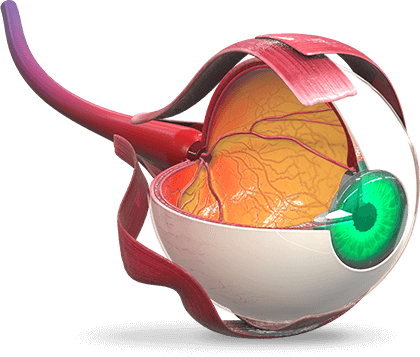Clinical Trials in AMD
Age-Related Macular Degeneration Studies
Age-related macular degeneration (AMD) is the leading cause of irreversible vision impairment in older adults. The prevalence of advanced AMD increases with each decade after age 50 years, with the highest prevalence found among those age >80 years. AMD affects upwards of 50 million people worldwide. [Roh.Yanoff Ophthalmology.2019]
There are two forms of AMD: neovascular (wet) and non-neovascular (dry). Although there is no cure for either type, vitamins, good nutrition, and smoking cessation can slow dry AMD progression; AREDS was the first study to demonstrate the benefit of antioxidant and zinc supplementation on the progression of AMD and the associated vision loss. [Roh.Yanoff.Ophthalmology.2019]
Wet AMD was originally treated with lasers and then photodynamic therapy with verteporfin until anti-vascular growth factor (anti-VEGF) injections were found to be more efficacious than laser treatment. Currently, the standard of care for the treatment of wet AMD is aflibercept and ranibizumab, although off-label bevacizumab is often used as well. Pegaptanib sodium (Macugen®) was the first anti-VEGF treatment approved for wet AMD but has been discontinued. [Roh.Yanoff Ophthalmology.2019] [Almony. AJMC 2023]
An ongoing debate in the treatment of wet AMD is the dosing regimen for anti-VEGF therapy. In this disease, effective anti-VEGF treatment necessitates monthly dosing, which can lead to a significant treatment burden for patients, caretakers, and treating physicians. [Almony. AJMC 2023] To overcome those burdens, alternative dosing strategies have been studied, included as-needed treatment (PRN) and treat-and-extend (T&E) therapy. [Almony. AJMC 2023]There are also approved drugs with longer duration of treatment intervals, such as aflibercept 8 mg, faricimab, and the ranibizumab port delivery system, with other therapies under investigation. [Almony. AJMC 2023] This section lists the most relevant clinical studies in AMD.
Click on the study name to see more details about each particular study. To enhance visibility of graphs and tables, click on the image to enlarge for expanding viewing.
Studies in Dry AMD
References
A Phase III, Multicenter, Randomized, Double-Masked, Active Comparator-Controlled Study to Evaluate the Efficacy and Safety of Faricimab in Patients With Neovascular Age-Related Macular Degeneration (TENAYA). Clinicaltrials.gov identifier: NCT03823287. Last updated February 16, 2023. https://clinicaltrials.gov/study/NCT03823287
A Phase III, Multicenter, Randomized, Double-Masked, Active Comparator-Controlled Study to Evaluate the Efficacy and Safety of Faricimab in Patients With Neovascular Age-Related Macular Degeneration (LUCERNE). Clinicaltrials.gov identifier: NCT03823300. Last updated January 13, 2023. https://clinicaltrials.gov/study/NCT03823300
Abraham P, Yue H, Wilson L. Randomized, double-masked, sham-controlled trial of ranibizumab for neovascular age-related macular degeneration: PIER study year 2. Am J Ophthalmol. 2010;150:315-324.e1.
Age-Related Eye Disease Study 2 Research Group. Lutein + zeaxanthin and omega-3 fatty acids for age-related macular degeneration: the Age-Related Eye Disease Study 2 (AREDS2) randomized clinical trial. JAMA. 2013;309:2005-2015.
Age-Related Eye Disease Study Research Group. A randomized, placebo-controlled, clinical trial of high-dose supplementation with vitamins C and E, beta carotene, and zinc for age-related macular degeneration and vision loss: AREDS report no. 8. Arch Ophthalmol. 2001;119:1417-1436.
Age-Related Eye Disease Study Research Group. The Age-Related Eye Disease Study (AREDS): Design implications AREDS report no.1. Control Clin Trials. 1999;20:573-600.
Almony A. Treatment approaches for neovascular age-related macular degeneration and diabetic macular edema. Am J Manag Care. 2023;29(6 suppl):S81-S89. https://www.ajmc.com/view/treatment-approaches-for-neovascular-age-related-macular-degeneration-and-diabetic-macular-edema
Berg K, Hadzalic E, Gjertsen I, et al. Ranibizumab or bevacizumab for neovascular age-related macular degeneration according to the Lucentis Compared to Avastin Study treat-and-extend protocol: Two-year results. Ophthalmology. 2016;123:51-59.
Brown DM, Kaiser PK, Michels M, Soubrane G, Heier JS, Kim RY, Sy JP, Schneider S; ANCHOR Study Group. Ranibizumab versus verteporfin for neovascular age-related macular degeneration. N Engl J Med. 2006;355:1432-1444.
Busbee BG, Ho AC, Brown DM, et al. Twelve-month efficacy and safety of 0.5 mg or 2.0 mg ranibizumab in patients with subfoveal neovascular age-related macular degeneration. Ophthalmology. 2013;120:1046-1056.
CATT Research Group, Martin DF, Maguire MG, et al. Ranibizumab and bevacizumab for neovascular age-related macular degeneration. N Engl J Med. 2011;364:1897-1908.
Cheung CMG, Lim JI, Priglinger S, et al. Anatomic Outcomes with Faricimab vs Aflibercept in Head-to-Head Dosing Phase of the TENAYA/LUCERNE Trials in Neovascular Age-related Macular Degeneration. Ophthalmology. Published online November 30, 2024. https://www.aaojournal.org/article/S0161-6420(24)00748-6/fulltext
Chew EY, Lindblad AS, Clemons T; Age-related Eye Disease Study Research Group. Summary results and recommendations from the age-related eye disease study. Arch Ophthalmol. 2009;127:1678-1679.
CATT Research Group, Maguire MG, Martin DF, et al. Five-Year Outcomes with Anti-Vascular Endothelial Growth Factor Treatment of Neovascular Age-Related Macular Degeneration: The Comparison of Age-Related Macular Degeneration Treatments Trials. Ophthalmology. 2016;123:1751-1761.
DeCroos FC, Reed D, Adam MK, et al. Treat-and-extend therapy using aflibercept for neovascular age-related macular degeneration: A prospective clinical trial. Am J Ophthalmol. 2017;180:142-150.
Dugel PU, Koh A, Ogura Y, et al. HAWK and HARRIER: Phase 3, multicenter, randomized, double-masked trials of brolucizumab for neovascular age-related macular degeneration. Ophthalmology. 2020;127:72-84.
Dugel PU, Singh RP, Koh A, et al. HAWK and HARRIER: Ninety-six-weekoutcomes from the phase 3 trials of brolucizumab for neovascular
age-related macular degeneration. Ophthalmology. 2021;128:189-199. https://www.aaojournal.org/article/S0161-6420(20)30570-4/fulltext
Galeone C, Turati F, Nicolò M, et al. Faricimab versus the standard of care for neovascular age-related macular degeneration in Italy: An indirect treatment comparison. Drug Target Insights. 2024;18:105-111. https://journals.aboutscience.eu/index.php/dti/article/view/3213
Gillies MC, Campain A, Barthelmes D, et al. Long-term outcomes of treatment of neovascular age-related macular degeneration: Data from an observational otudy. Ophthalmology. 2015;122:1837-1845.
Guymer RH, Markey CM, McAllister IL, et al. Tolerating subretinal fluid in neovascular age-related macular degeneration treated with ranibizumab using a treat-and-extend regimen: FLUID study 24-month results. Ophthalmology. 2019;126:723-734.
Heier JS, Brown DM, Chong V, et al. Intravitreal aflibercept (VEGF trap-eye) in wet age-related macular degeneration Ophthalmology. 2012;119:2537-2548.
Heier JS, Khanani AM, Ruiz CQ, et al. Efficacy, durability, and safety of intravitreal faricimab up to every 16 weeks for neovascular age-related macular degeneration (TENAYA and LUCERNE): Two randomised, double-masked, phase 3, non-inferiority trials. Lancet. 2022;399:729-740. https://www.thelancet.com/journals/lancet/article/PIIS0140-6736(22)00010-1/fulltext
Hillen M. Can brolucizumab extend the AMD anti-VEGF treatment interval? The Ophthalmologist. Published December 7, 2017. https://theophthalmologist.com/subspecialties/quite-a-stretch
Ho AC, Busbee BG, Regillo CD, et al. Twenty-four-month efficacy and safety of 0.5 mg or 2.0 mg ranibizumab in patients with subfoveal neovascular age-related macular degeneration. Ophthalmology. 2014;121:2181-2192.
Holekamp NM, Campochiaro PA, Chang MA, et al. Archway randomized phase 3 trial of the port delivery system with ranibizumab for neovascular age-related macular degeneration. Ophthalmology. 2021;S0161-6420(21)00734-X. Online ahead of print. doi:10.1016/j.ophtha.2021.09.016
Holz FG, Minnella AM, Tuli R, Yoganathan P, Parikh S, Hamilton R; LUMINOUS study group. Ranibizumab treatment patterns in prior ranibizumab-treated neovascular age-related macular degeneration patients: Real-world outcomes from the LUMINOUS study. PLoS One. 2020;30;15(12):e0244183.
Holz FG, Sadda SR, Busbee B, et al. Efficacy and safety of lampalizumab for geographic atrophy due to age-related macular degeneration: Chroma and Spectri phase 3 randomized clinical trials. JAMA Ophthalmol. 2018;136:666-677.
Holz FG, Tadayoni R, Beatty S, et al. Multi-country real-life experience of anti-vascular endothelial growth factor therapy for wet age-related macular degeneration. Br J Ophthalmol. 2015;99:220-226.
Kertes PJ, Galic IJ, Greve M, et al. Efficacy of a treat-and-extend regimen with ranibizumab in patients with neovascular age-related macular disease: A randomized clinical trial. JAMA Ophthalmol. 2020;138:244-250.
Khanani AM, Kotecha A, Chang A, et al. TENAYA and LUCERNE: Two-year results from the phase 3 neovascular age-related macular degeneration trials of faricimab with treat-and-extend dosing in year 2. Ophthalmology. 2024;131:914-926. https://www.aaojournal.org/article/S0161-6420(24)00134-9/fulltext
Lalwani GA, Rosenfeld PJ, Fung AE, et al. A variable-dosing regimen with intravitreal ranibizumab for neovascular age-related macular degeneration: Year 2 of the PrONTO Study. Am J Ophthalmol. 2009;148:43-58.e1.
NCT03525613. A Study to Compare the Efficacy and Safety of Intravitreal APL-2 Therapy With Sham Injections in Patients With Geographic Atrophy (GA) Secondary to Age-Related Macular Degeneration. Last update July 6, 2023. https://clinicaltrials.gov/ct2/show/NCT03525613
Ohji, M, Takahashi, K, Okada, AA, et al. Efficacy and safety of intravitreal aflibercept treat-and-extend regimens in exudative age-related macular degeneration: 52- and 96-week findings from ALTAIR. Adv Ther. 2020;37:1173–1187. doi:10.1007/s12325-020-01236-x
Parravano M, Viola F, Nicolò M, et al. Real-world evidence of anti-VEGF therapies in patients with neovascular age-related macular degeneration in Italy: The RADIANCE study. Eur J Ophthalmol. Published online February 3, 2025. https://journals.sagepub.com/doi/10.1177/11206721241310628
Peden MC, Suñer IJ, Hammer ME, Grizzard WS. Long-term outcomes in eyes receiving fixed-interval dosing of anti-vascular endothelial growth factor agents for wet age-related macular degeneration. Ophthalmology. 2015;122:803-808.
Randomized, Double-Masked, Active-Controlled, Phase 3 Study of the Efficacy and Safety of High Dose Aflibercept in Patients With Neovascular Age-Related Macular Degeneration. Clinicaltrials.gov identifier: NCT04423718. Last updated September 19, 2024. https://clinicaltrials.gov/study/NCT04423718
Rofagha S, Bhisitkul RB, Boyer DS, Sadda SR, Zhang K; SEVEN-UP Study Group. Seven-year outcomes in ranibizumab-treated patients in ANCHOR, MARINA, and HORIZON: A multicenter cohort study (SEVEN-UP). Ophthalmology. 2013;120:2292-2299.
Roh, M, Kim IK. Age-related macular degeneration. In: Yanoff M, ed. Ophthalmology. 5th ed. Elsevier; 2019(6.29):586-602.e3.
Rosenfeld PJ, Brown DM, Heier JS, et al. Ranibizumab for neovascular age-related macular degeneration. N Engl J Med. 2006;355:1419-1431.
Schmidt-Erfurth U, Eldem B, Guymer R, et al. Efficacy and safety of monthly versus quarterly ranibizumab treatment in neovascular age-related macular degeneration: The EXCITE study. Ophthalmology. 2011;118:831-839.
Silva R, Berta A, Larsen M, et al. Treat-and-extend versus monthly regimen in neovascular age-related macular degeneration: Results with ranibizumab from the TREND study. Ophthalmology. 2018;125:57-65.
Wong T. Aflibercept 8 mg in neovascular age-related macular degeneration: 156-week results from the PULSAR extension. Presented at: Macula Society 2025; February 15, 2025; Charlotte Harbour, FL. https://regeneronmedical.com/view-content?id=a1bPr000002XhmjIAC&type=Publications&disease=AMD&ta=Ophthalmology&congress=The%20Macula%20Society%202025
Wykoff CC, Ou WC, Brown DM, et al. Randomized trial of treat-and-extend versus monthly dosing for neovascular age-related macular degeneration: 2-year results of the TREX-AMD study. Ophthalmol Retina. 2017;1:314-321.
Wykoff CC, Ou WC, Croft DE, et al. Neovascular age-related macular degeneration management in the third year: Final results from the TREX-AMD randomised trial. Br J Ophthalmol. 2018;102:460-464.
All URLs accessed April 11, 2025

